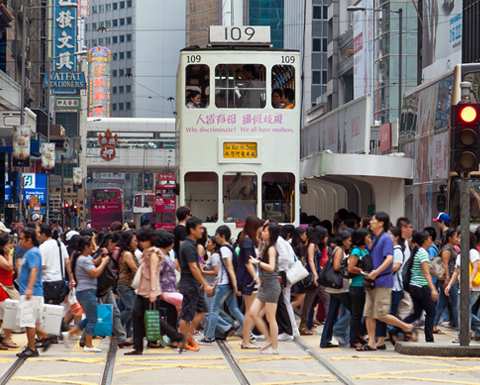The Fragrant Harbour, the Last Prize of the Empire, the City on the Hill, whatever you prefer to call it, Hong Kong is one of the most fascinating and exciting cities on the planet. Known as the city that never sleeps, it equates to the expression "time is money. "
Cosmopolitan yet maintaining millennia-old traditions, tolerant and wealthy, it is a city with thrilling optimism and energy. To live in Hong Kong is to live in the undeniable center of the fastest growing region in the world. Its geography makes it one of the most dramatic cities in the world, Hong Kong's steep mountains plunge directly into an aqua blue sea, affording views of either spectacular city and harbor lights or tranquil islands dotting the tropical ocean. With a geographical area of only 1,103 sq km and 80% of the population living on only 8% of the land it does require a lot of vertical living arrangements. Many apartments and houses take full advantage of spectacular views.
Living in Hong Kong will undoubtedly be different from home, but this HK guide is designed to get you acclimated in as short a time as possible. Hong Kong is a vibrant city with more things to do than a person could fit into a lifetime. With the help of this guide and an adventurous spirit, you and your family will rapidly become involved in the organizations, clubs, sports, attractions, trips, tours and social events that are an exciting and intrinsic part of the rewarding expatriate experience in this remarkable city.
Geographic Location
China is located off the East Asia continent, on the western shore of the Pacific Ocean.
China is a vast country, with a landmass of circa 9,600,000 square kilometers. Sharing borders with no less than 14 countries, China is the third-largest country in the world. It is almost identical in size to the United States of America. The coastline alone measures approximately 14,500 kilometers, and touches the Yellow Sea, the East China Sea and the South China Sea, all part of the Pacific Ocean.

Hong Kong is one of two Special Administrative Regions of the People's Republic of China, the other is Macau. Hong Kong is located in the Southeast area of China and is also referred to as the Hong Kong Special Administrative Region (HKSAR). It is divided into three principle areas; Hong Kong Island - the helm of the world's 3rd largest financial center; Kowloon - positioned north of Hong Kong Island across Victoria Harbour; and finally, the vast area of the New Territories, which borders China at the Guandong province.
Hong Kong became a Special Administrative Region (HKSAR) of The People's Republic of China on July 1, 1997. It has its own constitution, Basic Law, and Government, and in many ways, it operates as an independent international city state It is a disciplined, law abiding city with a very low crime rate.
The entire territory covers approximately 1,470 square kilometers of territory including 235 islands of varying sizes dotted mainly off the shores of Kowloon and the New Territories. The largest of all being Lantau, where Chep Lap Kok Airport is situated. Hong Kong Island itself is no larger than 78 square kilometers.
Language
Hong Kong's official language is Cantonese, the Chinese dialect of Guangdong. The use of Mandarin (or Putonghua) China's official dialect is increasingly on the rise in Hong Kong in recent years, however for now, all street signs and notices are in both English and Chinese.
The proficiency of English spoken by bus / taxi driver's tradesmen, service men and security guards alike can vary in levels, learning a few Cantonese words can help you get around Hong Kong. In the meantime, if you are having problems being understood, search your mind for synonyms and use them.
Most locals learned their English from the English, so try to think of the British equivalent, for example: 'boot' for car trunk, 'petrol' for gasoline, 'lift' for elevator. If all else fails, call a colleague or use the Hong Kong Taxi Translator app, which is very handy.
People
The total population of Hong Kong now extends to over 7.3 million people, with approximately 1.5 million people residing on Hong Kong Island and a further 2.1 in Kowloon and the remainder in the New Territories.
Although there are more than 50 different nationalities living in Hong Kong, 94% of the population is ethnically Chinese, the majority of which of Hakka and Chiu Chow origins. Large numbers of Hong Kong Chinese residents also hold dual passport status with Canada, Australia, Britain or the US, and they may or may not speak Chinese. The remaining 5% of the population is composed of non-ethnic Chinese forming a highly visible group despite their smaller numbers.
The main nationalities among the non-Chinese residents are Filipinos (150,000), Indonesians (150,000), Americans (60,000), British, French (est. 20,000), Canadians (300,000 many of them dual passport holders), Indian Thais, Japanese, Australians and Thais. Other major nationalities represented in Hong Kong are New Zealanders and Malays, plus smaller numbers of Sri Lankan and Pakistanis.
It is the large international representation of different nationalities living together with the openness of society that makes Hong Kong such a surprisingly cosmopolitan community. From the Alliance Frangalse to the St. Andrew's Society, the Japan Society to the India Club, there is a multitude of groups and associations that celebrate the various national days and provide business and social interaction.
Religion
Religion in Hong Kong enjoys a high degree of freedom, guaranteed by the Basic Law, which was signed in 1990 and went into effect in 1997.
90% of Hong Kong's population practices a mix of local religions, most predominantly Buddhism, Taoism and Confucianism.
The Christian community accounts for about 9% of the total population and is nearly equally divided between Catholics and Protestants, although other, smaller communities exist as well, such as Sikh, Muslim, Jewish, Hindu, and Baha'i.
Concerns over a lack of religious freedom after the 1997 handover have largely subsided.



